Our Seminar in Journalism class has been privelaged with many distinguished guest speakers, such as Eugene Kane, Mike Gousha, Sharif Durhams, and Charles Franklin. But our guest speaker this Tuesday, Dave Umhoefer, may have been my favorite yet. Umhoefer gave us some behind-the-scenes knowledge on what goes into Politifact Wisconsin and the statements they rate. The Milwaukee Journal Sentinel's Politifact team consists of three writers (one does not write full-time for Politifact) and an editor. They scour everything from speeches and political ads to podcasts and talk show appearances and flyers. Over 90 percent of the statements they fact check comes from their own research. What does it take to be a PolitiFact reporter? For one thing, you need to be interested in politics. Umhoefer and his team have to find and read through of documents, and that would be very boring if you were not even interested in its content. "It's about being smart, and open-minded, and fair, and willing to do the research," Umhoefer said. "It's very researchy. We stop when there's no longer a dispute." Their standard for choosing statements: Anything that has them asking "Really? Is that true?" They look for claims or statements that are interesting and/or ridiculous. If they are genuinely wondering if a statement could be true or not, they assume their readers are too, and they do a fact check. If there is evidence that the candidate knew better when he or she made the ridiculous claim, it is kind of an automatic pants-on-fire rating, Umhoefer said. Umhoefer had great things to say about his readers. He said his team gets lots of thoughful suggestions from readers who want to get to the bottom of the facts. "People really care about this stuff, they really want to get the answers, and they're very appreciative when they do," he said. But how do they make sure that they are not using either too many Republican or Democratic statements, which would give the appearance of biased, partisan writing? Umhoefer said they don't really keep track of Republican verses Democratic statements they've fact-checked, or if they have focused on one candidate. If they did, it would negatively affect their reporting and research. When a guest speaker shows a clip from Jon Stewart and shares some of the funnier statements made by politicians, it will be hard for other guest speakers to top that. But in additon to providing some humor, Umhoefer shared some great information on the inner workings of PolitiFact Wisconsin and the responsibilies of its staff.
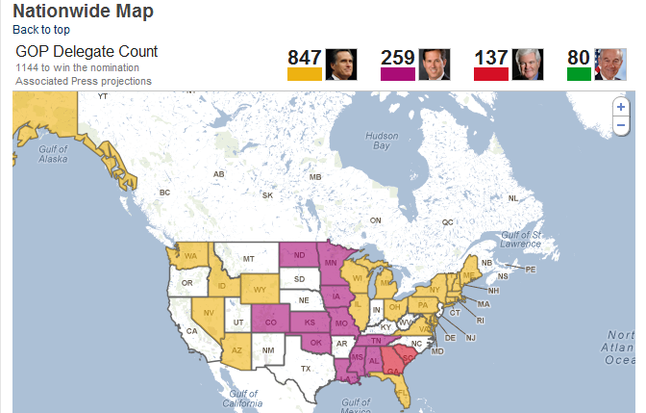
Taking a look at the Denver Post this week again, I found myself once again unimpressed with their coverage and infographics in regards to the 2012 presidential election.
The picture above is their infographic on the delegate count for Republicans. While it gives you all of the information you need, it does so in a very bland way that fails to distinguish itself from any other news site. In addition, above the infographic on the webpage, it provides links to the Super Tuesday primary results. This is nice and all, except that Super Tuesday was quite some time ago, and multiple primaries have taken place since then.
It just gave me the feeling of the Denver Post does not care very much about its coverage if it does not even bother to update its site with the newest primary information.
This is nothing new though. Throughout the semester, I have been disappointed with the Denver Post's coverage of the primaries. If it covers it at all, it for the most part it sticks to AP coverage. I would expect more from a big-time newspaper like the Denver Post.
Last Thursday was a very hectic day. Waking up at 7 a.m. to take a make-up test for my nutrition class, driving to a grade school right after to take video and pictures for a project I am working on for Milwaukee Neighborhood News Service, going to the nutrition class, and then going back to the school to complete an interview. Because of scheduling, I ended up having to skip my Seminar in Journalism class. Professor Lowe emailed me, telling me to get notes from my friend and classmate Eric Oliver. While I did get his notes, I found out that I really did not need to. The blogs from all of my classmates on that day's topic, political embed reporters, gave me all of the information I needed. Check out the blog posts from my classmates to read up on political embeds: Caroline Campbell, Erin Caughey, Tessa Fox, Allison Kruschke, Eric Oliver, Heather Ronaldson, Mark Strotman, Sarah Torres, and Diana Voigt.
This past Thursday, our journalism class set out to access the public files from local broadcast television stations for a ProPublica project. The public file is file that television stations are required to keep that keeps track of advertising spending for political advertising. We sought to find how much money various Super PAC's spent on advertising. Wisconsin held its presidential primaries on April 3, so candidates were sure to be spending money on advertising.
I went to TMJ4 Milwaukee with my classmates Eric and Mark. I was expecting hostility towards us, as I figured the network did not like people exploring the public file and possibly stirring up trouble. It seemed like this would be reality at first, as the receptionist questioned why all three of us needed to access the public file rather than just one person.
However, the woman who helped us get the public file could not have been more helpful or nice towards the three of us. We explained how this was a class project and that our class would be going to all the local networks to access the public file, which may have eased her mind a little bit. Only a couple of the Super PAC's that we were supposed to get information on had purchased ads with TMJ4. We scanned this information and sent it on to ProPublica.
This was a good journalism opportunity for us, as our teacher Mr.Lowe insisted it would be, rather than an "assignment." It was a neat experience to seek out this information to bring to the public light, and a good experience in simple investigative
Wisconsin held their Republican and Democratic presidential primaries on Tuesday August 3, and Eric Oliver and I conducted exit polls for our Seminar in Journalism class. For detailed results of the exit poll and an accompanying story detailing my experiences, click the eon the picture o The results of our exit poll: Mitt Romney won the Republican primary hands down. Romney would win for real later that night. I conducted my polling at a polling station in Marquette University's Alumni Memorial Union. I thought that the high amount of students would give Ron Paul more votes, but he received just nine percent of the total votes in our exit poll. I enjoyed my experience polling voters. I was hanging out around the polling station for almost three hours, and observing the process of voters registering, voting, voting again because the messed up their first ballot was very interesting. At one point, one of the election judges called me over and asked me to sign in as an "election obsever," even giving me a sticker to wear. This made it feel very official for me.
Today, Milwaukee Journal Sentinel columnist Eugene Kane paid a visit to our Seminar in Journalism class. Our main topics of discussion were what it takes to be a columnist and the Trayvon Martin shooting. Kane has been a columnist at the Journal Sentinel since 1995, when he was offered a column upon his return to Milwaukee. Kane gave some words of wisdom to our class of budding journalists. He said if you can find your own stories, the newsroom will appreciate it; otherwise, you are at the mercy of the editor who picks your stories for you. Columnists have to choose their own stories. Columnists do have more freedom to write stuff. "You are writing it in your voice," Kane said. "It's your audience." Kane said that most journalists are subjective anyway simply by what stories they choose to cover or not cover. Our class discussed having a voice quite a bit, as class members asked several questions on the topic. Kane mentioned some of his journalism idols from Philadelphia, where he was born. "Their voice was so distinctive, sometimes people could just read it out loud and you could tell who had written it," Kane said, as our professor Herbert Lowe nodded along in agreement (Lowe is also from Philadelphia) Kane says having a column can also be difficult because of the background work it requires. It is not just writing everything off the top of your head, Kane said. You have to keep your eyes and ears open for what people are talking about. It is not hard coming up with story ideas; the difficulty lies in turning those ideas into good columns.
The shooting of Trayvon Martin, a 17-year-old African American, in the gated community of Sanford, Florida has caused a national media storm of coverage and editorials. Most prominent newspapers, in addition to broadcast news and cable news channels, have featured coverage of the shooting. Mallory Jean Tenore notes that journalists need to call this a "killling" or "shooting" for the time being, not a "murder." The AP Stylebook dictates that unless there has been a criminial conviction, the only time it is acceptable to write "murder" is if there was a clear-cut pre-meditated motive for the shooting. There have been reports of George Zimmerman, the community watchman who fatally shot Martin, having a racial bias and calling police 46 times since the beginning of 2011, often to report "suspicious activity" by African-Americans. There have also been reports that Martin punched Zimmerman to the ground and attacked him, leading Zimmerman to shoot in self-defense. An article by Eugen Kane in the Milwaukee Journal Sentinel about how wearing a hoodie should not define a person was very interesting. I was suprised by Geraldo Rivera's contention that if Martin had not been wearing a hoodie, he would still be alive. I wear my Chicago Cubs hoodie for six months out of the year, and anyone can tell you that does not make me look threatening. Nor should people assume that African-Americans or Hispanics are a threat just because they are wearing a hoodie. I think that the Trayvon Martin story is a good reminder for journalists to be careful with what language they use in their articles, because there bias might be revealed if they do not. It is important for journalists to come across to their audiences as unbiased sources for information, or else lose respect or credibiliy from readers who disagree with their stance.
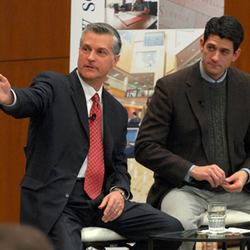 Mike Gousha, Distinguished Fellow in Law and Policy at Marquette University's Law school and host of " On the Issues" and " Upfront" visited our Seminar in Journalism class on Thursday. Gousha talked about the great distrust of the media today, but how that it is part of the landscape when you try to cover politics. Both sides, Democrats and Republicans, like to bully the media, so political reporters need thick skin. It is also hard to cover politics because, as Gousha said, "Peoply today do not want to be informed. They want to be affirmed." This is why cable channels like Fox News and MSNBC are successful. They see themselves as news operations at night, but "when the sun goes down, they see themselves as something else," said Gousha, referring to the distinguishment between the news programs and opinion shows that these channels offer. "I think that gets a little dicey," Gousha said. Gousha also discussed the value of talk shows like his "Upfront" or national shows like " Face the Nation" and " Meet the Press" to candidates. Gousha believes that candidates have moved to other platforms such as Facebook and Twitter to get their messages across, but these talk shows still hold some value to them. They tend to try and go on the programs that will be sympathetic to them. Gousha looks to have his programs be a place for serious civil discourse and "a force for public good." He likes to use "old school journalism," in which he asks the tough questions, but in a civil way. Gousha said it is not his job to be prosecutor. "There's a lot of fire, and sometimes not so much light," said Gousha. In other words, sometimes programs become all about the ratings-friendly shouting matches and disagreements, rather than facts-full and productive debates that helps viewers find the answers.
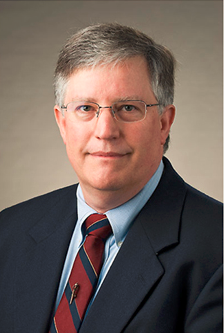 Charles Frankin, Visiting Professor of Law at Marquette University's Law School and co-founder of Pollster.com, visited our journalism class Tuesday to discuss polling and its relationship with politics. "How do we know what the public wants otherwise?" This is the question Franklin asked us as to why polling is so important, especially in politics. However, polling is not very cheap, and many newspapers will only publish polls if they get it for free. Franklin created Pollster.com in 2006 with Mark Rosenthal in 2006 after finding an investor. His relationship with Pollster.com ended when it was bought by the Huffington Post, but he was still around when the website received 20 million hits in November 2008, the month President Barack Obama won the presidential election. Franklin discussed some of the duties of a pollster. For one thing, polling is journalism and it gives real information to people, but they can be misused. He gave the example of Bush approval ratings from February of one year to May of that same year. The reports in May said that his approval rating had been falling since February, but in reality, his polling had reached a low between those months and had been rebounding. So while his approval rating overall was down from February, it had actually been going up at the time it was reported his approval ratings have been going down since February. Franklin also shared some debates in polling, such as whether or not "don't know" should be provided as a choice or if pollsters should just note when respondents says they do not know. He used this example: When asking who is prime minister of Britian or Speaker of the House, men seemed to be more knowledgeable than women. This is because so many women were choosing the "don't know" option. However, when the polls were repeated, and the don't know answer was taking away, and women were encouraged to take a guess, they proved just as knowledgeable on the topic.
Marquette University students are enjoying spring break this week, but students in Professors Lowe and Scotton's class have some researching to do.
Thankfully the links to everything we need to read up on were provided for us. Our class is to have a distinguished guest next Tueday: polling expert Charles Frankin. We had to read up on Franklin's bio, some of the polls he has conducted, and various other information on what goes into polling.
After reading up on Franklin and polling, I am excited to here him speak to us next week. As if that is not enough, veteran reporter Mike Gousha is to visit our class two days after Franklin's visit. It should be a fun and informative week in our Seminar in Journalism class, and come back next week to read blog posts on how each visit went and what I learned from them.
|
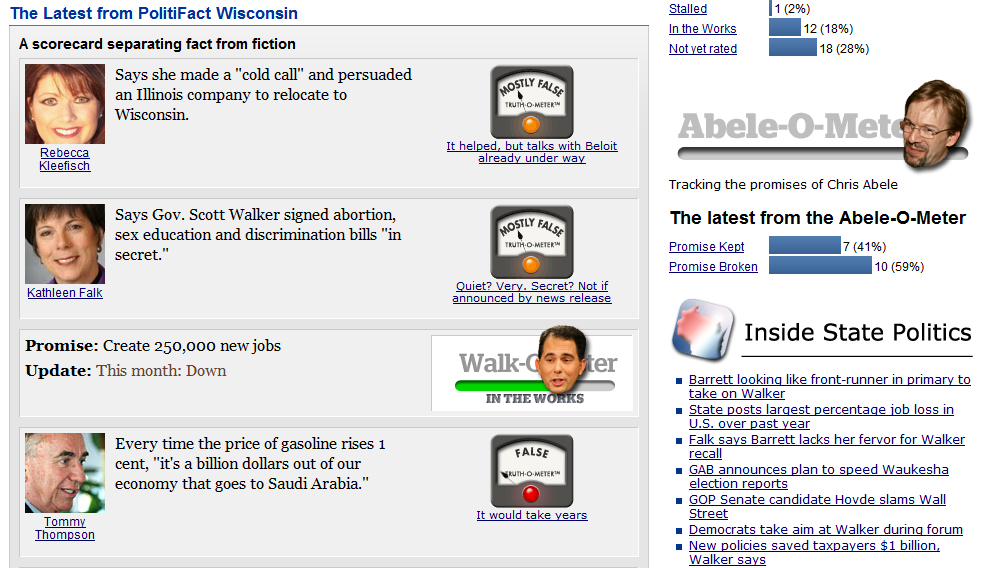

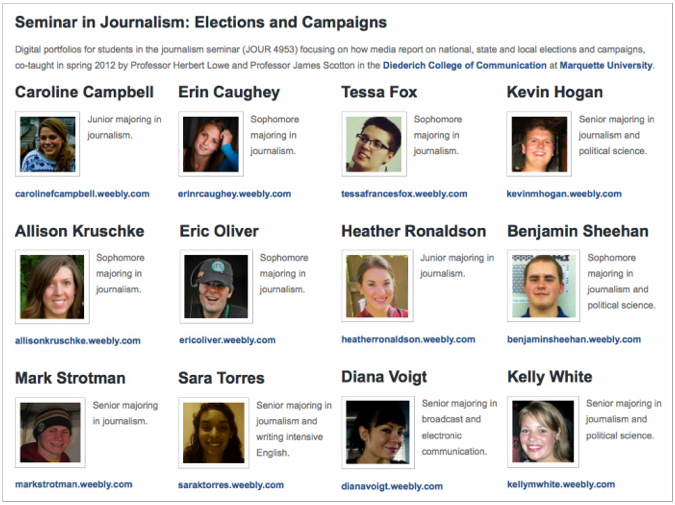
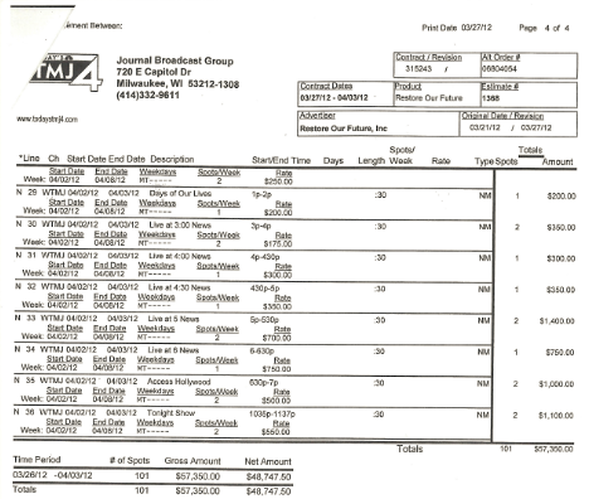
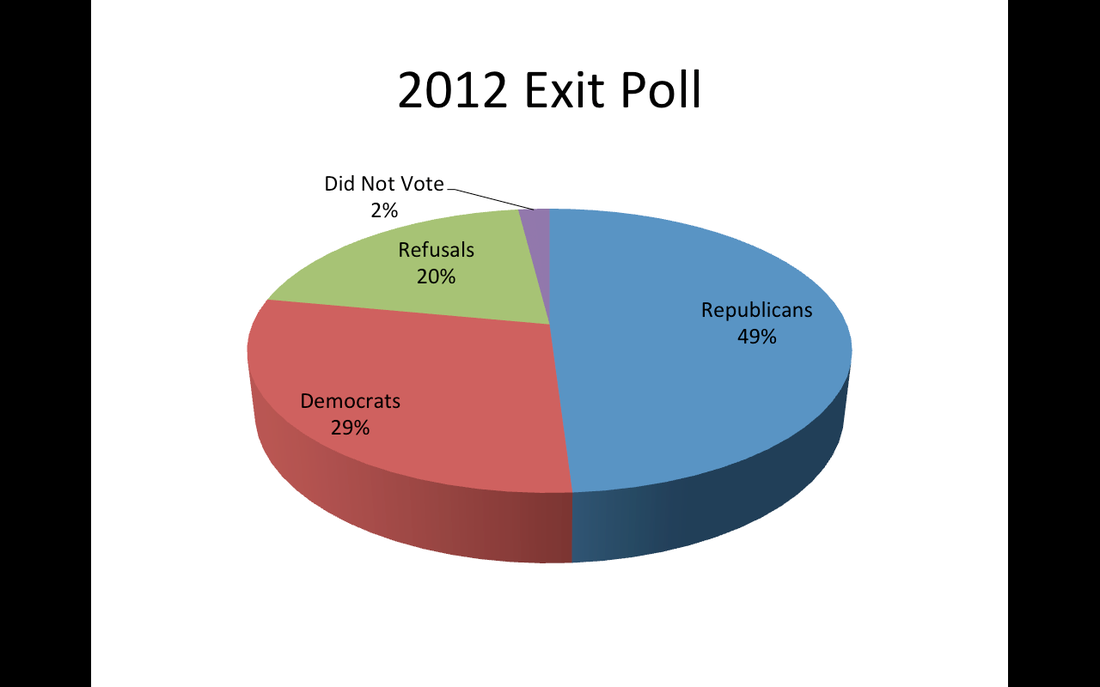
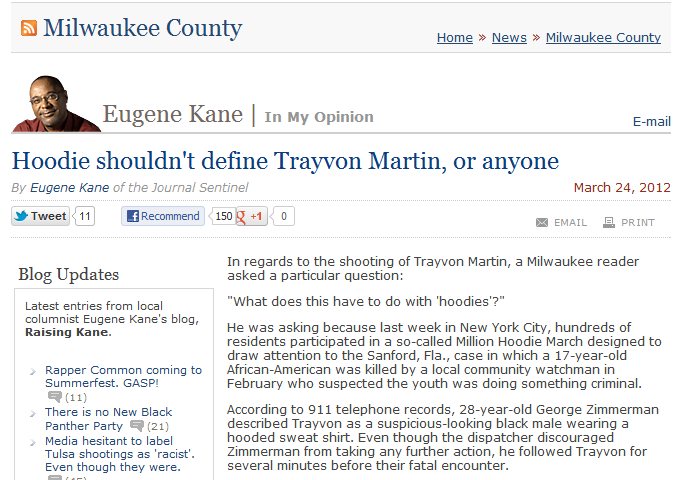
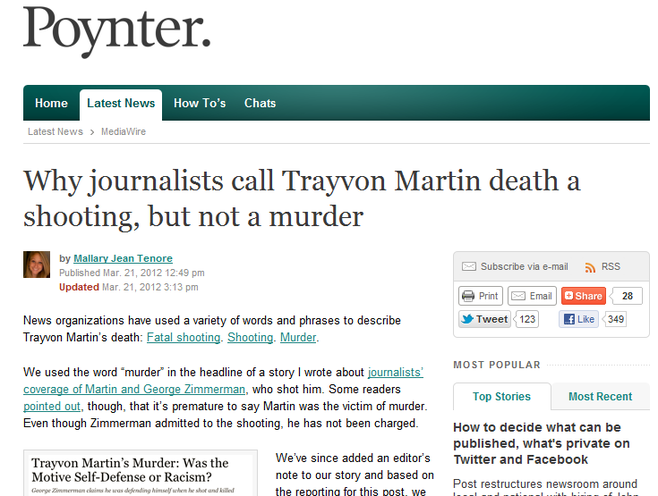


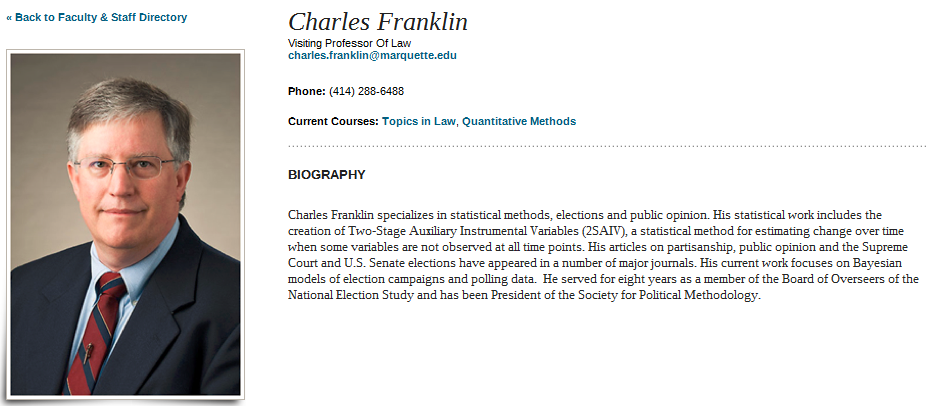
 RSS Feed
RSS Feed